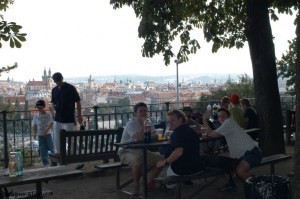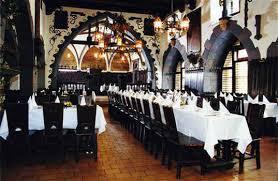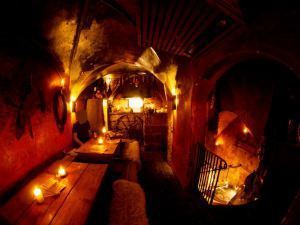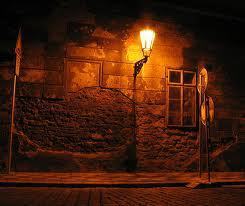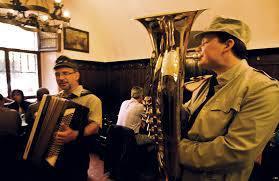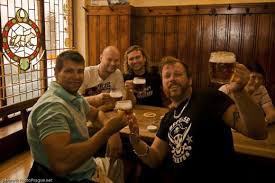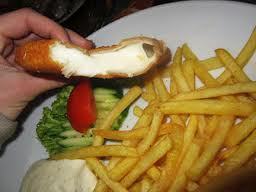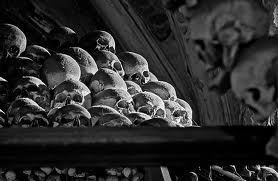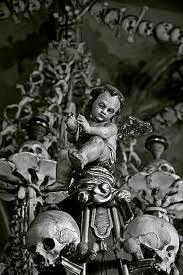Victoria Dougherty's Blog, page 24
May 20, 2014
A Wife’s Ode to the Cocktail Hour
 My husband and I had a lot of fun before we had kids. I mean A LOT. We traveled, we spent money like crack whores, we had nooners for heaven’s sake.
My husband and I had a lot of fun before we had kids. I mean A LOT. We traveled, we spent money like crack whores, we had nooners for heaven’s sake.
And we also loved going out for cocktails. We probably met at some swanky bar, or curious hell hole, or trendy hipster joint five days a week after work.
It was fun.
And least of all because we got a little loopy. The fact is that most of the time we really didn’t. What we would do is laugh and talk and debrief each other about our days. Sometimes we had pow-wows about our dreams and where we wanted to be in five years. Or maybe we just chattered about where we wanted to go the coming weekend.
I always made sure to put some lipstick on and leave whatever bad attitude I had brewing at the door before I walked in to any of these establishments. I wanted my husband to remember why he married me and see a glimpse of the woman he first laid eyes on at a candlelit pub in Prague back in 1994.
It’s like I always tell him, “The last twenty-five year-old woman you had was me.” I don’t say it to depress the man.
When we had kids, we knew our lives would change, and we were ready. We understood that dragging a bunch of kids around the world was not only prohibitively expensive, but no fun. Kids want to go to the beach or Disney World. And they will make you pay if you try to take them to, say, The Louvre. Nor could we lay around naked reading the newspaper anymore. Not unless we wanted to go to jail.
But my husband and I are pretty determined people and we were adamant about having a relationship that didn’t exclusively revolve around family activities. We wanted to stay interested in one another and have a way of getting caught up on each other’s soap opera.
So, we instituted a cocktail hour.
Every evening, before we set our sights on making dinner, my husband mixes us a great cocktail and we sit down on our porch or in my husband’s office and get down to the business of making each other laugh, telling a story or sharing a great idea and trying to get the other on board. There are only two rules to our cocktail hour: no children allowed, no talking about children allowed (unless it’s a really great story).
And while the kids complain every once in a while, or try to crash our party, we’re pretty emphatic about it. I once said to my daughter, “Would you prefer to live in a house where your mom and dad don’t want to spend time together?” That was a revelation for her.
Over the years, I have to admit that our cocktail hour has caused a little bit of embarrassment in our small town. Our youngest, for instance, was charged at school with painting her daddy’s “favorite things” on a flower pot as a Father’s Day present. She painted nothing but martini glasses, and I’m sure that got a good laugh in the teacher’s lounge. My son once took a message from a caller and said, “Sorry, but it’s cocktail hour and you don’t want to mess with that. My mom will call you back.” The caller was – no kidding – his Sunday School teacher.
Our cocktail hour is worth a few wagging tongues, though.
It’s a little wisp of a vacation at the end of the day. A mini-date that has acted as a daily reminder of how much we enjoy each other’s company when we’re not fixing lunches and feeling confounded by “new” math and watching Young Frankenstein for the 1500th time. It is what has helped keep our relationship a living, breathing thing – even if we’re not carefree young adults anymore with stubbornly thin physiques and the confidence to smoke a cigarette without the fear of impending doom.


May 13, 2014
Pure Poison: Reading John Dolan’s New Thriller and Telling His Future
What’s great about John having a new thriller coming out is that it gives me an excuse to have him on Cold. And to pour a cold drink, sit back and have some fun.
After all, there’s no one I know in or out of the blogosphere who shares my sick sense of humor and is up for just about anything. Especially when it involves either debauchery or quackery.
Case in point, when I asked John if he’d like to have his fortune read by my new best friend, Svetlana the gypsy fortuneteller, he said, “I’d be delighted!”
The following is a transcript of their encounter. No names have been changed to protect the innocent.
John: Oh, my God, the light in here!
Svetlana: Is too dark for you, pasty-boy?
John: No, too bright. I can see how hideously ugly you are. Vic told me you were rough looking, but I hadn’t expected this.
Svetlana: I no understand. Excuse me, I must put in my teeth, yes?
John: I do prefer my women to have teeth on the inside of their mouth.
Svetlana: Listen, pasty-boy, I thought Englishmens were supposed to be charming. Perhaps you live in 3rd World country Thailand too long, yes? My daughter Dragomira travel in Thailand with caravan and make good money. She no play ping pong, though, so her friend Jaguska make more.
John: I’m sure your daughter is as lovely as you are.
Svetlana: You want meet her? She fifteen and practically virgin. I no make you pay. Just take her.
John: Thank you, but I’m married.
Svetlana: So is she. Two times only. I tell you – practically virgin.
John: I’m afraid I’ll have to decline.
Svetlana: Hmmmf! Look, you want to have reading or no?
John: I may as well, seeing as I’m here.
Svetlana: You can ask me three question.
John: Really?
Svetlana: Yes. Now you have two question left.
John: Hey, you’re quite sharp for an old girl. All right, then. Tell me how the sales of my new book, A Poison Tree, are going to do.
Svetlana: Hmn. I see your book contains lots of overblown language, your characters’ actions lack psychological credibility, and your plot is shitty and plagiarized.
John: Did Victoria put you up to this? It’s that review I did of The Bone Church, isn’t it?
Svetlana: I show you, it say right here – I no lie. I no even know what “psychological credibility” mean. It sound like name for Russian militia. Tell me, does your book’s cover have a picture of almost naked, attractive lady on it?
John: Yes. Why?
Svetlana: Then it will do well. People like the pretty covers. They treat books like woman. What is your last question?
John: What does the immediate future hold for me personally?
Svetlana: You have the Death card.
John: Ah, I know what this means. It means I have big changes ahead. The end of one phase of my life and the start of a new one, right?
Svetlana: No. It means you are going to die soon.
John: Hang on. I thought it was to do with transition.
Svetlana: Sometimes. But in certain circumstances – like this one – it signifies imminent death.
John: What sort of circumstances?
Svetlana: Like when you insult gypsy, for instance.
John: You know, now that I have a good look at you, you’re actually quite attractive.
Svetlana: I close curtains. I do dance for you. You live long time.
John: Ummm…sure. Just one dance, though, okay?
A Poison Tree – Amazon US http://www.amazon.com/Poison-Tree-Time-Blood-Karma-ebook/dp/B00K0CRX8A/ref=la_B008IIERF0_1_3_title_0_main?s=books&ie=UTF8&qid=1399469037&sr=1-3
A Poison Tree – Amazon UK http://www.amazon.co.uk/Poison-Tree-Time-Blood-Karma-ebook/dp/B00K0CRX8A/ref=sr_1_1?s=digital-text&ie=UTF8&qid=1399468968&sr=1-1&keywords=a+poison+tree
JD’s Website http://johndaviddolan.wix.com/johndolanauthor
JD on Twitter (@JohnDolanAuthor) https://twitter.com/JohnDolanAuthor
JD Facebook Page https://www.facebook.com/JohnDolanAuthor?ref=hl
JD Author Page on Amazon http://www.amazon.com/John-Dolan/e/B008IIERF0/ref=ntt_athr_dp_pel_pop_1
JD Author Page on Goodreads https://www.goodreads.com/author/show/6550683.John_Dolan
Pictures of JD naked with Asian Women http://johndolanwriter.blogspot.com/


May 6, 2014
For My Mother
 In honor of Mother’s Day this coming Sunday, I’d like to run my Modern Love piece from a few years ago. It’s not because I’m lazy and can’t come up with a new post to honor the occasion. It’s that I just can’t seem to find a better way of expressing my gratitude. This really does say it all, and anything less would be…less.
In honor of Mother’s Day this coming Sunday, I’d like to run my Modern Love piece from a few years ago. It’s not because I’m lazy and can’t come up with a new post to honor the occasion. It’s that I just can’t seem to find a better way of expressing my gratitude. This really does say it all, and anything less would be…less.
The Wrong Kind of Inheritance
By VICTORIA DOUGHERTY
Published: July 20, 2008, New York Times, Modern Love
I ALWAYS knew something would happen to one of my children. I never said it out loud. I didn’t allow myself to dwell on it. But the feeling was there: a vague superstition that visited me on my paranoid days, the kind of day that would find me in my children’s rooms at midnight, making sure they were still breathing.
Some of this superstition is in my heritage; I’m from a long line of Slavs, from what used to be Czechoslovakia, where a lot of people believe in curses. But my fear is bolstered by the fact that both my mother and my mother’s mother have lost children in devastating ways.
Sixty years ago, my grandmother daringly escaped from postwar Czechoslovakia to join her husband, who had defected in Switzerland with some teammates from the Czechoslovak national hockey team, only to be foiled by the Communists from reclaiming the three daughters they had left behind (my mother and two aunts), who were then ages 6, 4, and 6 months.
Children were frequently secured in those days through neutral intermediaries, but in her case, because of my grandfather’s high-profile defection, the Czechoslovak government put its boot down. As a result, my grandmother wasn’t able to see her children again for two decades.
By that time, my mother, who was the oldest child, had already lost her 4-year-old son, Victor, when he died from the flu — a victim of poor medical care in their tiny Czechoslovak village. Months later, with my surviving brother in tow, she risked prison and the threat of machine guns to escape to the United States, where she gave birth to me.
Our tradition holds that curses come in threes. And while the change in geography was a definite improvement for our family, I feared that the curse couldn’t be far behind. So I waited my turn.
When it came I knew it would be something of biblical proportions, on par with swarms of locusts or the earth swallowing me whole — something I wouldn’t be equipped to handle. After all, I was no freedom fighter or border crosser. I was just a middle-class girl from the Chicago suburbs.
I was sure my soft American life would be my undoing once it was my turn to share some family anguish. It had already taken its toll on my relationship with my mother, creating a gulf between us we couldn’t seem to bridge.
My girlfriends spent hours on the phone with their mothers, gabbing about everything from job woes to weight gain, whereas my relationship with my mother seemed to consist mostly of awkward lunches that started with a bang of best intentions, but quickly fizzled, often ending midmeal with her saying, “Well, got to go … ”
I wondered if it was a cultural thing. As a child I was embarrassed by everything about my mother: her accent, her conservative political views, her va-va-voom beauty, her flashy sense of style, and the way she dressed me like an off-the-rack hybrid of Elizabeth Taylor and Ivana Trump. At her urging, I even received the sacrament of confirmation with a full face of makeup and red fingernails.
But it went deeper. Behind my mother’s high-pitched giggle and enormous rhinestone brooches, under her Cleopatra-style cosmetics and bold animal print pantsuits, was a remove and sorrow I could never penetrate.
It was a result of years of being stalked by the Czechoslovak secret police, of missing her parents, of being forced upon resentful relatives, and, more than anything, of not being able to save my brother.
I had often tried to get her to talk about it. I wanted to know who my brother was and, more important, get closer to her. But she always shut me down. “You have no idea,” she would say, ending the conversation. And she was right, because even after becoming a parent myself, I couldn’t — wouldn’t — comprehend what it felt like to lose a child.
Until last year.
A little more than halfway through my third pregnancy, my husband and I learned that our baby had a rare tumor on her tailbone. In a matter of weeks it grew so large and distinct within me that strangers asked if I was carrying twins. By my last trimester, the tumor was the size of a basketball and had begun to compromise the baby’s kidney and liver functions.
When the doctors could wait no longer, Josephine was born by Caesarean section seven weeks early. She was not breathing on her own. Less than an hour after her birth, she was rushed into eight hours of surgery.
Her surgeon was able to remove the mass and reconstruct her bottom, and we hoped that would be the end of it. But it wasn’t. As it turned out, Josephine’s tumor wasn’t benign, as originally predicted, but aggressive and cancerous. In the months following her birth she would survive five surgeries and several rounds of chemotherapy that began roughly around her original due date.
The curse had arrived, and it was a doozy. But the earth didn’t swallow me whole. I was neither too soft nor too weak to handle it. I was able to keep standing and be there for my daughter for one simple reason: my mother was there for me.
My husband often travels internationally for work and was in India when Josephine’s tumor was discovered. I called my mother not to ask for help but just to tell her. At that point the doctors hoped the tumor would stay the nice, safe size of a lemon, or at least wouldn’t grow any bigger than a grapefruit.
Regardless, my mother immediately packed, left her home and job in Chicago and drove through the night to our home in Virginia. As Josephine’s tumor doubled in size weekly and her condition worsened, my mother’s visits became more frequent and more essential. She helped me stir oatmeal when the pain in my back kept me from standing at the stove; she took my children to the park when I had a hard time walking; she rubbed my feet at night the way my husband would have if he were there.
After her birth, Josephine had to be operated on and treated by specialists at the Children’s Hospital of Philadelphia, and during that stretch my mother bunked with me at the Ronald McDonald House. Eight weeks later, when Josephine was transferred to University of Virginia Hospital in Charlottesville, Va., my mother moved in with us and stayed for months.
Despite a heart problem, she kept late nights at the hospital, staying with Josephine so that I could care for my two other children. She tended to Josephine’s surgical scars and cared for her ostomy with the expert hands of a nurse. At times she stared so fiercely into Josephine’s eyes that I thought she alone was keeping my daughter alive.
She cooked and cleaned our house when we didn’t care if we ate or if toys littered our living room. She laughed with us. She even told stories about my late brother, a topic that hadn’t been broached since that last time I had tried to get her to talk about him, in 2001.
One night, after we caught my son playing “target practice” in the bathroom, aiming his urine at imaginary bull’s-eyes and hitting everything but the toilet, she said: “That’s nothing. One time I found your brothers shooting the pee at each other like they were shooting the gun — bang, bang! Having two boys, there was always something funny.”
Later she told me that after Victor died, she couldn’t even understand how the sun could be shining; it made no sense to her. It was the first time she had ever spoken to me this way.
It sounds strange to hear myself say it, given the pain and turmoil of Josephine’s battle, but my mother and I had a wonderful time. We cooked goulash together and spoke in our first common language, Czech, instead of lazing into English when we didn’t feel like summoning a better translation of our feelings. We became experts on the ways of The Force, watching “Star Wars” movies over and over with my two older children.
My mother got to know our friends and became a part of our community. And as our friends got to know her better, they remarked on how similar we are. For the first time, this observation didn’t leave us looking warily at each other, perplexed and uncomfortable.
The behind-the-back hand gestures I had once employed to signal to friends “Don’t mind her, she’s a little crazy” have been replaced by a desire to hold her hand as we walk along the street. I’m no longer embarrassed when my mother gives my friends “the lessons in the life” (as she puts it) by extolling her love for Richard Nixon, her favorite American president.
JOSEPHINE’S illness may well be part of a curse, but it is still the best worst thing ever to happen to me. While robbing me forever of my peace of mind, it has given me my mother.
And it has made my mother a member of our family. She has gained the adoration of our little ones, whom she routinely piles into her car for outings to Toys “R” Us (or Dhoy-Za-Roos, as it is now pronounced in our house). She has a daughter who is her new best friend. Most of all, she has Josephine.
I’m still too superstitious to declare victory, but it looks as if my daughter is going to make it. If so, Josephine will have broken the curse and at last brought a mother and her child together in our family instead of inserting a painful wedge.
My mother and I were talking about my late brother a few weeks ago. It was near Victor’s birthday, which has always been a difficult time for her, a time when she normally would have withdrawn and hid from everyone until the day passed. But not this year. She was too busy assembling my son’s Millennium Falcon Lego brick by brick, and painting my 3-year-old daughter’s toenails a tarty red.
As she cut the tags off a hot-pink leopard snuggly she had bought for Josephine, her eyes began to fill with tears. “For 40 years I had a hole in my heart,” she whispered. “And now that hole is filled.”


May 1, 2014
Welcome to the May Day Launch Party for THE BONE CHURCH!
 Comrades! So nice to see you here.
Comrades! So nice to see you here.
Please, pour yourself a shot of Russian vodka (Smirnoff in freezer), have a seat next to your Bulgarian mistress and get ready for some Cold War fun!
First – thank you for joining me.
I’ve been preparing for this for weeks – not shaving or bathing properly for that authentic Cold War Eastern European feel.
I’ve also been looking forward the chatting, trading barbs and Cold War stories with all of my Cold, Cold friends.
What can you expect at the TBC Launch Party? Well, first – there will be a fortune teller, so please feel free to ask her (Svetlana) anything and everything about your future via “COMMENTS.” She will surely give you the straight up.
This is Svetlana.
In the meantime, sit back, relax and mingle with the unsavory characters who usually haunt my blog. Sneak into my study and steal my microfilm! Hell, poison my drink for all I care.
And yes, an ebook or two of The Bone Church will be given away – if you’re an interesting enough party guest, that is.
And remember…”No great movement designed to change the world can bear to be laughed at or belittled. Mockery is a rust that corrodes all it touches.” MILAN KUNDERA


April 28, 2014
Cold’s First Annual Virtual Pub Crawl Thru Prague
Allow me to be presumptuous. I’m assuming that since you follow Cold, you love – or at least appreciate on some level – a great beer or five.
Back in the day when I was a Prague-dweller, beer-drinking wasn’t just for weekends or evenings. You could drink beer any time at all and with absolutely no social repercussions! My boss had a large cardboard box (I mean it could have fit three Barbie Dreamhouses fully assembled) next to his desk and it was piled high with empty beer bottles. In fact, I once sauntered into work around 9:00 am (or thereabouts) and was immediately assaulted by four drunkish colleagues – in addition to said boss – who proceeded to hold me down, lift up my skirt and spank me with a willow branch. I remember thinking during this whole surreal episode, “If this happened to me in America, I’d be rich.”
Men could be seen having a beer for breakfast and no one even blinked.
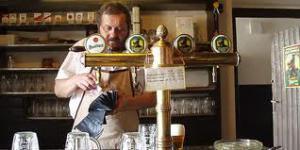
Would you like one of these with your coffee and pancakes, sir?
So, in honor of my Prague glory days, I thought I’d take myself and any willing Cold reader on little pub crawl through Prague. I’ll drag you to some of my favorite pubs and beer gardens – even some places I’ve never visited personally, but came highly recommended by Czech friends. I’ll wax nostalgic about wonderful hell-holes that have long-since closed. Communist slop-houses with dirty tablecloths, surly waiters (I’ve been told to “blow myself” for asking for a refill – no joke), food that gives a new Webster definition to the word “greasy,” emphysema inducing air, and great stories with even greater cheap beer.
I’ll even introduce you to where I first met my husband, and you’ll see why we’ve lasted so long.
Ah, so where do we begin? Being that it’s spring, I think we must begin outside, while we’re still sober enough to enjoy a good view.
Behold the Letna Park Beer Garden – hands-down my favorite spot to down a brewsky in Prague. Not only does it offer some of the most beautiful views of the city, but boasts a refreshingly un-diverse menu of traditional Czech food – like this goulash for instance.
They serve Gambrinus beer – at least they used to. It’s a beer named after the King of Flanders for his mythical brewing abilities. In truth, who cares? Because any beer you drink in Prague will be better than the sad, watered-down carbonated glug you’re used to drinking on most nights – even your self-respecting microbrews.
Moving along, once you’ve watched the sunset from Letna, you might be in the mood for something more…cultivated. A nod to Prague’s illustrious past, perhaps. In this case I’ve got two suggestions for you. The first is for the purist. For that, I recommend trekking on over to U Fleku, which is no less than a national landmark. U Fleku is, I believe, the only brewery in Eastern Europe that has been brewing beer for 500 years straight. They started brewing only a few years after Columbus discovered America, in fact, so they’re pretty damned good at it. The food is meh, but it hardly matters. The atmosphere is straight out of the 15th century – and there’s even a beer garden.
And for something less historical and more posed, but really no less enchanting, you can try any number of medieval “themed” bars. Don’t get turned off by that description. They’re more often than not located in centuries-old buildings and decorated in a style that is totally organic to the Dark Ages. So it’s not like going to a Old World version of TGI Fridays. And the beer, no matter what, will be outstanding. Here’s an example:
What’s great about Prague is that even what you might think would turn out to be a cheesy theme bar can have more magic than any place you’ve ever chugged a pint. The pub where my husband and I met, for instance, was and is still called Molly Malone’s. And yes, in addition to Czech varieties, they do serve Irish beer. But that’s where the similarities end. Molly’s sits in a centuries old building and becomes a fire-lit Pilsner fairy-land once the sun goes down.
This is Molly’s on the outside. I’m blushing.
For more traditional Czech pub encounters, you still have plenty of options – even if the pubs of yesteryear aren’t quite the dime-a-dozen they used to be. Most of them offer lace curtains, vole (the Czech version of “good ole boys”), families, bad hygiene, ladies who will happily show you a good time, accordion music, beer cheese (you don’t want to know) and no non-smoking section. I love them, but they’re not for everybody.
My favorite Czech pub food is Smazeny Syr – or a breaded and deep fried block of cheese served with french fries and copious dollops of mayonnaise. Pardon me while I have my heart-attack.
Don’t know where I can find a beer bath, but Czech this out anyway (bad, I know). Doesn’t it make you want to move there?
And finally, but downright at the top of my list are the pubs of the bygone era – that magnificent time when communism was already kaput, and everyone was free to think, speak, do whatever the bejeezus they wanted to do, but the whole place was still trapped in a time warp anywhere between 1951 and 1968. It was when pubs and restaurants like Deminka and Slovansky Dum had yet to be privatized and still offered great, uber-cheap (as in a few cents) beer, awful food, and a staff that was chronically lazy, rude, utterly classless, smelly and could be counted on for absolutely nothing – except to bring you a fantastic beer.
At Deminka, a waiter actually slapped my head when I dared to pick up the menu off the table. “What would it look like if we let everyone touch it?” he demanded. When I asked for french fries in place of dumplings with my pork, I was told that “Only an idiot would ask for that. Everyone knows it doesn’t go together.”
Sadly, I could find no pictures of those establishments. You’ll have to use your imagination.
But know, that now matter what, at the end of the night you’ll always end up looking like this:


April 22, 2014
Faith and the Nine Year-Old Skeptic
It’s a cistercian monastery that sits with the most beautiful pastoral view of central Virginia and is lorded over by an intellectual priest and a body of warm, pious nuns who always make our children feel not only that they are welcome, but that everyone there is giddy for their arrival.
It’s the only church I know of where the Easter Sunday sermon references Nietzsche and “Perpectivism.” I didn’t know what Perspectivism was until this past Sunday, but it basically means that there are many possible truths. And it was a perfect introduction to the nut of the sermon, which centered around faith: its meaning, its contradictions, its place in our lives, its tenuousness at times, its controversies.
It was also an eerily appropriate follow-up to a conversation I had with my middle daughter – my nine year-old, Charlotte – the night before, as we were sitting down to dinner at a “fancy” new hamburger joint. (By fancy, I mean they serve alcohol as well as milkshakes.)
My husband and I had just taken our children to see the new, re-envisioned biblical epic, Noah, and my daughter had some issues.
Aside from the fact that Charlotte really hated the movie, which she called “dark” and “mean,” she also confessed – for the first time after years of Sunday school, Catholic masses, and getting her sweet cheeks pinched by the above nuns (whom she loves), that she sees “absolutely no proof for the existence of God.” Furthermore, she feels her Sundays are wasted by Sunday School classes that teach a concept she doesn’t even believe in.
I was at first tempted to counter her smart-alec tone with my own and say something like, “Yeah, well I don’t know if organic food is any better than regular food, but I still pay twice the price for the fruit I put in your lunch box.” But something stopped me.
Perhaps it was the hand of the God my daughter denies :)
Instead, I told Charlotte that doubt was a part of faith – not separated from it. Faith, I said, is about believing in the absence of hard evidence one way or another. It’s how we go about love and art, which we also can’t prove. Love is an act of faith. Art – as an artist or someone who merely loves art – is an act of faith and interpretation. And I also told her that it’s her journey – not mine – and I’m not forcing her to believe. I’m just giving her information, and – if she’s interested – my point of view.
She was NOT interested in my point of view. So, I dropped it. She’d attended a sleepover party the night before and had a grueling soccer match that afternoon, so I knew she was tired and crabby and not exactly in an open-minded mood. I did slip it in there that she still has to go to Sunday school, though.
“I figured you’d say that,” she said, barely above a whisper.
Charlotte is our most intellectually restless child.
And she is also our most fragile.
She has a heart that she can barely contain, and wears it on her sleeve, her lapel, the buckle of her shoe. For her, a B+ is equivalent to failure, and the slightest hint of a reprimand sends her bottom lip into a quiver. She’s overly generous to both her friends and her enemies – a trait that has been pointed out by every one of her teachers. Charlotte is most proud of winning the “Good Citizenship Award” at school.
And I fear, more than any of our other children, she needs faith – an internal resource that will be there for her when we can’t be.
Charlotte sat on my lap for most of Easter mass. As we stood and recited the Rites of Baptism – as is the custom on Easter – she held my hand and looked at me as she gave her responses.
Do you believe in the God the Father, almighty, creator of heaven and earth? I do, she said.
Do you believe in Jesus Christ, his only son, our Lord, who was born of the Virgin Mary, was crucified, died, and was buried, rose from the dead and is now seated at the right hand of the Father? Again, I do.
Do you believe in the Holy Spirit, the holy Catholic Church, the communion of saints, the forgiveness of sins, the resurrection of the body, and life everlasting? I do.
This is our faith. This is the faith of the Church, we are proud to profess it, in Christ Jesus our Lord. Amen.
She probably didn’t mean it.
I knew she was trying to please me, and she did, but not for the reason she might think.
I was pleased because of the almost unbearable love I feel for her. I was proud of her independent nature and innate skepticism. She always thinks things through before drawing a conclusion.
And I was happy – for her – that she wasn’t quite finished thinking through faith, despite her assertions to the contrary on the night before.


April 21, 2014
Phantom Bigfoot & The Vampettes from Venus By Simon Okill
 Welcome to Big Beaver, home of Duane Dexter aka Phantom Bigfoot. Teen superhero, Duane, must get Sheriff Lou and Agent Virgil hitched on orders of the alien Elders. Simple enough! But not for Phantom Bigfoot and Guardian of the forest, who manages to screw things up just when he least expects it.
Welcome to Big Beaver, home of Duane Dexter aka Phantom Bigfoot. Teen superhero, Duane, must get Sheriff Lou and Agent Virgil hitched on orders of the alien Elders. Simple enough! But not for Phantom Bigfoot and Guardian of the forest, who manages to screw things up just when he least expects it.
And when he least expects it, Duane is rendered helpless as a new menace invades Big Beaver in the shape of a punk band – The Vampettes from Venus. It soon transpires these Vampettes are not your ordinary gals from outa town. Duane and his close friend, MB, know space vampires when they see them.
So Phantom Bigfoot with his trusty sidekick, MB, fight these insidious vampires head on in a free-for-all, no-holds-barred struggle. Will Duane save the day yet again or will these sexy Vampettes drink Big Beaver dry?
Paranormal author Simon Okill lives in a South Wales coastal town with his wife where he is currently writing about the crazy adventures of Phantom Bigfoot and his tribe of Bigfoot Babes. Phantom Bigfoot & The Vampettes from Venus is book #2 of his YA adventure series, Phantom Bigfoot Series, to be followed by Phantom Bigfoot & The Haunted House. Book #1 is already out there – Phantom Bigfoot Strikes Again. Simon has also written two other books, all available on Amazon – Luna Sanguis and Luna Aeturnus, dark Gothic romance set in France 1925 as well as several screenplays.
http://facebook.com/simondokillwriter
https://www.amazon.com/author/simondokillwriter
http://goodreads.com/tassyoneill
Moments later Duane and MB tried the front door of the Bruger house. Of course it was locked. They hammered at the door.
Duane turned around sensing trouble and wished he hadn’t. Hovering a few feet above MB like a giant red bat was that raven-haired Vampette with the freaky hairdo, mouth open wide, tongue licking large fangs.
“I am Vampirella. I care not for neither of you fellas,” the Vampette sang her words like that punk rocker Sid Vicious, screeching out the syllables with a high-pitched hiss.
What did she mean she cared not for neither of them? His sixth sense told him she didn’t want their blood because they weren’t virgins. Did that mean they were safe from the Vampette’s fangs? Yeah it would seem so, Duane hoped.
“From somewhere within the deep, you cannot resist the need to sleep,” Vampirella screeched her song.
Duane cautioned himself to be wary. Her singing had made him feel a little hazy. The Vampette was obviously using some kind of insidious mind control on them with her lyrics.
The Vampette drifted towards Duane on her red cape wings and stopped less than a few inches from him, her fangs just a millimeter from his bare neck. Duane’s stomach gurgled with fear but strangely enough he didn’t feel like barfing. He stood his ground.
“Chosen by The Elders you have been. The Guardian of the forest I have seen,” Vampirella sang harshly.
“Go to hell!” Duane said, glancing at MB cowering behind him for protection.
“What does she mean by The Guardian of the forest?” MB asked as if those might be his last words.
Vampirella didn’t reply. She cocked her head then sang, “Vermillia … Venusa … Vixenella … come join me.”
The other three punk Vampettes floated down from the roof under their red cape wings and landed silently before Duane and MB.
“Beau is pure, Beau is sweet, he is our lure, he is our treat,” Vampirella and the other three Vampettes sang like demented sirens.
Duane and MB backed up to the front door and hammered to be let in, both shouting, “Let us in for fuck’s sake. Let us in!”
Learn how to cook – and I mean cook – not French fries and steak – any dufus can do that. There’s nothing that says you love your mate than cooking a romantic meal. Say Spinach Souffle for instance. Ha-ha! There’s always one wisenheimer who says, “Spinach Souffle for instance.” The reason I mention this meal is it is too delicious for words to describe, and not only that, but when those pesky bits of spinach stick to your mate’s teeth you can lick them off which leads to you-know-what. Now we come to dessert. Yoghurt. Any flavour will do and don’t eat it all as it comes in handy for after dessert you-know-what. Great fun to lick off your mate’s you-know-whatsits
http://amzn.to/1dTQKVT UK
http://amzn.to/1cVYaVd US


April 15, 2014
The Bone Church: Real and Imagined
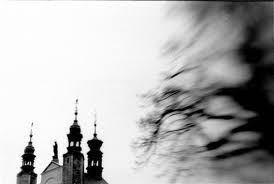 The Ossuary at Sedlec – or Bone Church of Kutna Hora as it’s more commonly known – is a relatively plain church from the exterior. At least as far as Old World European standards go. It sits about an hour outside of Prague in the Czech Republic, and last time I was there, some ten years ago, it was still a dingy mustard color on the outside.
The Ossuary at Sedlec – or Bone Church of Kutna Hora as it’s more commonly known – is a relatively plain church from the exterior. At least as far as Old World European standards go. It sits about an hour outside of Prague in the Czech Republic, and last time I was there, some ten years ago, it was still a dingy mustard color on the outside.
In fairness, most ossuaries are just church basements filled with neatly piled up human bones, so there typically isn’t anything out of the ordinary about the actual structure it’s housed in. There’s no electrically powered Grim Reaper standing with a scythe a chuckling a deep MWAAHHAAHAAA, the way there is at any self-respecting haunted house.
In fact, the only feature that advertised that there just might be more than meets the eye to The Bone Church of Kutna Hora was the skull and crossbones spiked at the top of its spire – right where you’d usually see a crucifix.
Otherwise, the place just sat there like Boris Karloff without make-up.
When I visited on a gloomy October day in 2004, dragging my 20 month-old son and a prehistoric digital camera with me, I thought I would have to muscle my way through a throng of tourists.
But we were alone there.
Suitably, the only sounds we could hear were my own boot heels clicking on the stone tiles as we entered the foyer, the wheels of my son’s dilapidated MacLaren stroller and the whistle of a fall wind – the kind that blows tufts of dead leaves in a swirl. Some of those, mostly a fresh cluster of fiery orange oaks, blew with us into the Bone Church. A young man, very pale and black haired with a warm smile and crooked teeth, greeted us.
It should have been eerie, but it was exquisite.
A short staircase – also stone – led us down into the chamber, where an enormous chandelier lorded over the place. It was fashioned entirely of human bone – utilizing every bone in the human body, the young man told us in his hushed, churchy voice. The skulls would have held candles, I suppose, but the chandelier was unlit. In fact, the only light in the Bone Church came from the outside through a few kidney-shaped Gothic windows.
There were urns made primarily of femurs, a bone Coat of Arms belonging to the Schwarzenberg family, an endless garland (skull-vertebrae-vertebrae-knee cap, skull-tibia-skull-tibia) strung loosely along the trim like it was Christmas and several pyramids constructed of bones – ones that sat in iron-barred enclaves like slayed prisoners. 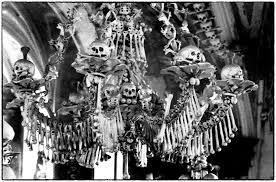
My son and I stood there absorbing the sheer magnitude of death around us. People who’d died of flu, arsenic poisoning, small pox, swords thrust into their rib cage, a heart-attack, a mallet to the temple, infection, childbirth, trampling, a broken heart.
The bones of some 30,000 Christians beautified this stark, chapel-like holy chamber – prominent and presumably pious Christians who had been promised burial in the Church of All Saints cemetery. But due to a string of plagues and wars, had found themselves without a place to land after they blew their last breath.
It occurred to me this strange permanent installation of sacred art – the devil’s art, some called it – was actually a clever solution to a very sensitive dilemma. Church teachings, after all, forbade cremation. And the poor souls who had counted on burial in the Church of All Saints holy cemetery had paid considerable tithes to earn their way into some kind of dignified and noble entombment.
And what could be more noble than the care and inspired vision required to create such a communal, yet deeply personal way to honor the departed? To me, it was the ultimate expression of both grief and hope.
My little son – and my first and most tender reminder of my own mortality – was getting restless and hungry, so I snapped a couple of pictures and we left.
But The Bone Church stayed with me and made its way into a story I’d begun writing.
The Bone Church: A Novel is now available on Amazon:


April 8, 2014
The Cardinal’s Preoccupation
 St. Peter’s Square was already awash in gold when Felix emerged from the Vatican’s private visitors’ chapel. For a moment, he watched the sun teeter at the top of the basilica’s spire.
St. Peter’s Square was already awash in gold when Felix emerged from the Vatican’s private visitors’ chapel. For a moment, he watched the sun teeter at the top of the basilica’s spire.
Cardinal Merillini stood at the entrance to Bernini’s Colonnade with Primo at his side.
“Your Excellency.” Felix bowed, kissing the Cardinal’s ring.
“Liebermann has a contact in Prague,” the Cardinal began. His voice was slow and deliberate, as if he had just awakened from a long sleep. “This man wants no help from our German friend – only as a point man on the inside. Distrusts Germans. But he claims he can deliver the woman by the end of the month.” He waved Primo ahead and the two men began their walk through the Colonnade. “It’s a man in Czech intelligence – a comer, not some flak in charge of tampering with the mail.”
“What would a man like that want with us?” Felix asked.
“He wants to be paid, of course.”
It was unlike the Cardinal to be so direct about their extra-vocational endeavors. The Cardinal was by nature an eloquent man who preferred the realm of ideas to the details of their realization. “She has a son, you know,” the Cardinal said. “The husband – this man Melan – was executed in 1952. He was one of the defendants in the Slanský show trials.” The Cardinal cleared his throat, but his voice remained rough, like a mortar and pestle grinding seed. “Pitiful turn of events,” he continued. “Fourteen men. All of them Jewish, all of them innocent. Forced to confess to concocted acts of treason – and for what? For being intellectuals instead of blunt instruments.” 
Felix had never met Antonin Melan personally, but had heard he was a decent fellow, an ideologue who believed communism would save the world after the ravages of the Second World War. His only crime had been to trust the wrong people. And to be a true believer instead of a mere apparatchik. Any records of Melan’s immediate family – his wife, Magdalena, and the son, Ales, had been hidden or destroyed by the Soviets. For years Felix had searched, but was unable to find a trace of any Melan – either alive or dead. It wasn’t as if Antonin Melan’s family had disappeared, but rather had never existed – a not uncommon fate for those refusing to denounce a disgraced relative.
Until last month.
Magdalena Melan’s name had resurfaced in Czechoslovakia as a foreign agent – a ludicrous charge if there ever was one. She was now, officially, an Enemy of the State rather than just a nuisance who needed to quietly go away.
“Does he have a name?” Felix asked.
“Who?”
“This contact – the man from Czech intelligence.”
The Cardinal tipped his chin up, his lips forming a short, puckered line. “You know better than to ask.” The Cardinal reached into his vestment and retrieved a large folder from under his arm. He handed it to Felix, contemplating the Czech Jesuit, who sifted through its contents. Cardinal Merillini had hoped to dissuade Felix from any involvement beyond the strategic on this assignment, but forbidding him to go would’ve only invited disobedience. And once a priest flagrantly disobeyed an order, it wasn’t long before he disavowed his robe.
“Thank you.” Felix bowed his head, and the Cardinal led the way into an early Renaissance building, its interior decked in blue-veined marble. The Cardinal’s office was perched on the third floor corner, one of many rooms that comprised his suite of apartments.
For Felix, visiting the Cardinal’s apartments was a bit like coming home. The artists whose work his father had so admired from a distance – Caravaggio, Pisanello, Daret – were mounted in heavy gold frames. Michelangelo had painted images of the apostles on the wall alongside the banister, one of the few artifacts left unmolested during a seventeenth-century renovation.
Felix’s first glimpse of those same apostles hadn’t been in the books of his father’s study or on his initial visit to the Cardinal’s office some years before, however. It had been in his mind’s eye when he was little more than a child – a reverie that he’d tried to convince himself was the result of an overactive imagination. Felix was a boy of nine and skating alone on a pond in the Blansko forest, when a still, mental image of Simon the Zealot, disciple of Jesus, avenging priest of the temple, appeared before him. Felix mistook him for a neighbor at first and began skating towards the figure when St. Bartholomew emerged from the snow. As Simon whispered into Bartholomew’s ear, they faded away into a jumble of tree roots.
Back then, Felix had explained away every prescient dream and strange, wakeful image, the way a dweller in an old house might justify the creak of footsteps when he knew no one else was home.
“God’s delays are not God’s denials,” the Cardinal rasped.
Felix looked up. His Excellency wasn’t referring to Michelangelo or the apostles, but had turned to face a painting that hung high behind his desk. It was an eighteenth century depiction of Lady Polyxena of Lobkowicz presenting the Infant of Prague sculpture to the Carmelites. A new addition to the Cardinal’s collection, it had been loaned to him indefinitely by the Bishop of Verona. 
The chandelier above them flickered, but the Cardinal ignored it. He placed his spectacles on his nose and squinted through the thick glass, studying the Infant’s rosebud lips. He bit down, exposing his teeth as he noticed an irregular brushstroke in the painting – an unforgivable error made by a careless restorer. “Hmm,” he lamented. His thumb and index finger rode the links on a platinum chain strung around his neck, until they landed on a tiny replica of the Infant of Prague. The Cardinal picked up the holy relic, kissed it and made the sign of the cross before letting it dangle over his heart again.
The lights flickered once more, and this time they went out. A moment later, Felix heard the handle of the Cardinal’s office door jiggle as his secretary, Francesco, entered. The young priest carried with him an arabesque lantern, the oil’s acrid aroma saturating the room.
“Buona sera, Your Excellency,” the Cardinal’s secretary bid. His engorged eyeballs glowed in the dim lighting. He explained that an electrical shortage had been causing problems for hours. It appeared to stem from the Cardinal’s apartments – most likely in the western corner – and he begged permission to enter his superior’s private quarters. The Cardinal agreed.
“It smells strangely of …it’s sweet, isn’t it?” Felix observed, as they padded over the silk carpets in the Cardinal’s living room. A low mist of smoke, barely visible in the glimmer of the lone oil lamp, hovered amidst the Cardinal’s Baroque furniture. Francesco led the way into the Cardinal’s bath, illuminating a carved oval sink resembling a birdbath – all gold and trimmed in gemstones. A bidet, shrouded by red velvet curtains, hugged the southern-most wall. They could hear a faint drip.
“I bathed in the Sistine apartments today,” the Cardinal said. “Not here.”
Francesco opened the stained glass entry surrounding the bathtub. “Mercy,” the young priest gasped.
Inside the glazed marble tub – his body splayed and rigid and his mouth open wide like a snake hole – lay Father Duch, an accountant to the Vienna Diocese. The towel warmer, still spitting an occasional spark, was partly submerged in the bathwater and discreetly covered the Father’s genitals.
Thanks so much for reading, my Cold friends. The Bone Church will be available on Amazon from April 15th (Print on Demand and ebook). In the meantime, please enter my giveaway on Goodreads for a chance to win a free, signed copy.
https://www.goodreads.com/book/show/21457935-the-bone-church


March 31, 2014
The Bone Church Cometh
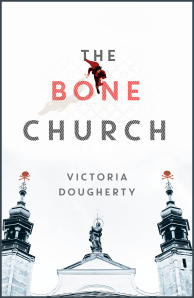 My Cold War thriller, The Bone Church, debuts on April 15th and I’m nervous, excited and more than a little bit relieved. Honestly, it feels like my daughter’s wedding or something.
My Cold War thriller, The Bone Church, debuts on April 15th and I’m nervous, excited and more than a little bit relieved. Honestly, it feels like my daughter’s wedding or something.
Here’s an idea of what it’s about:
In the surreal and paranoid underworld of wartime Prague, fugitive lovers Felix Andel and Magdalena Ruza make some dubious alliances — with a mysterious Roman Catholic cardinal, a
reckless sculptor intent on making a big political statement, and a gypsy with a risky sex life.
As one by one their chances for �fleeing the country collapse, the two join a plot to assassinate Hitler’s nefarious Minister of Public Enlightenment and Propaganda, Josef Goebbels.
But the assassination attempt goes wildly wrong, propelling the lovers in separate directions. Felix’s destiny is sealed at the Bone Church, a mystical pilgrimage site on the outskirts of Prague, while Magdalena is thrust even deeper into the bowels of a city that betrayed her and a homeland soon to be swallowed by the Soviets.
As they emerge from the shadowy fog of World War II, and stagger into the foul haze of the Cold War, Felix and Magdalena must confront the past, and a dangerous, uncertain future.
The Bone Church is quite a ride, my Cold friends.
I’m posting Chapter One in two parts – this week and next – so please have a look. I’m hoping to hook you. And do enter my Goodreads giveaway for a chance at a free signed copy (click the link after the chapter segment).
Truly, I’d love your comments. Nothing means more to a writer. And thanks in advance. Cold readers are thinkers, seekers, lovers and dreamers. What you have to say means as much to me as what I sit down to write. And that’s saying a lot.
THE BONE CHURCH, A NOVEL
Chapter 1
Vatican City: March 11, 1956
 The viscount with the dense, copper hair rocked back and forth in the front pew. He whispered to the man next to him.
The viscount with the dense, copper hair rocked back and forth in the front pew. He whispered to the man next to him.
Felix pretended not to notice the disturbance. He unlocked the tabernacle and retrieved a gold chalice, pyx, paten, and crucifix from its purple silk interior, then arranged them on the altar before the Cardinal. A sweet, breathy gust of air blew in from the only open window in the chapel, making Felix’s cassock flutter against his legs. It felt good – almost like the touch of a woman’s fingertips.
“In nomine Patris, et Filii, et Spiritus Sancti. Amen,” the Cardinal said, making the sign of the cross over his head and breast.
At long last, the viscount looked up from his rocking and whispering. He folded his hands and consigned them to his lap, where Felix could still see on the man’s middle finger the shiny indentation where a bulbous emerald ring had rested until a few weeks ago. It had come time to pay off the Romanian attaché and his pet border guard in exchange for a wispy woman with an advanced case of Parkinson’s disease.
“But what wouldn’t a man do for his mother?” The viscount had said upon their last meeting. Plenty, Felix had thought. He’d once watched a man shoot his mother in the face for a single gold tooth rolled in a piece of blood-stained suede. Of course, the attaché had failed to disclose that the viscount’s mother – in addition to her Parkinson’s – was also in the late stages
of dementia, soiling herself and exhibiting a total vocabulary of five words: “Paris, last Christmas” and “hideous curtains!”
Still, the viscount appeared grateful for her safe recovery. He’d even remarked that she was eating better.
“Judica me deus, et discerne causam meam de gente non sancta: ab homine iniquo; et doloso erue me.”
Psalm 42. Felix recited it in tandem with the Cardinal. Judge me, O God, distinguish my cause from the nation that is not holy; deliver me from the unjust and deceitful man.
Mass was brief – twenty-five minutes start to finish – and Felix was glad of it. Cardinal Carlo Merillini’s obligation to the row of elegant gentlemen bowed in the front pew was fulfilled. The Cardinal now stood in the back of the nave with Primo, his valet, while Felix collected the tithes and thanked the visitors: an Argentine cattleman, an American steel magnate, a Polish-born hotelier, the viscount, and a handful of other influential Catholics.
“Envy and death, Father,” muttered the cattleman.
“I’m sorry?”
“It’s all they know.” He was a little man, fully bald.
“Yes.”
The cattleman spoke lovingly of his Lithuanian wife. Pretty woman. Felix had met her before.
“Envy and death,” the cattleman repeated.
The cattleman’s sister-in-law and young niece had been killed by a Russian soldier at the end of the War. Raped on a bed of horse dung in their stables, then bludgeoned with a bottle of
cheap brown vodka. Only his wife’s daughter from a first marriage had survived the incident, hiding behind a bushel of hay and biting a salt lick to keep quiet. The cattleman mouthed the girl’s name.
It was just the year before last when Felix had finally been able to arrange passage for the girl. Already sixteen by then, she’d been instructed to dress as a prostitute – presumably for one of the port guards – but was instead folded into the bowels of a sofa and smuggled over the Baltic Sea into Sweden.
“She still hates horses,” the man said. “And she hates her mother.” The cattleman tapped Felix’s forehead with his index finger. “Poisoned her mind.”
Felix looked the man in the eye and clasped his hand. He then took the cattleman’s envelope and handed it to Primo.
“And this is the acquaintance I wrote to you about.” The cattleman tugged at Felix’s cassock.
Felix nodded at the Polish hotelier, though they hadn’t been officially introduced. The man took Felix’s hand and squeezed, bringing it to his lips and rubbing his twice shaved cheek over the priest’s knuckles.
“A tragic story if I ever heard one,” the cattleman said.
The Pole began to sob.
Felix put his hand on the Pole’s head and assured him that he would speak to the Cardinal on his behalf. “These matters take time,” he explained.
He didn’t have the heart to tell the man how far down in the queue he was – how many dozens had come before him begging about a wife, a husband, a son or daughter, a brother, a lover. And how Felix, too, had begged and prayed until finally his turn had come.
Thanks again and here’s the link for the giveaway:
https://www.goodreads.com/book/show/21457935-the-bone-church



















